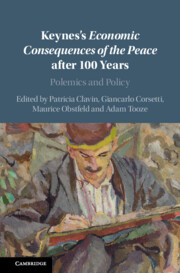Book contents
- Keynes’s Economic Consequences of the Peace after 100 Years
- Keynes’s Economic Consequences of the Peace after 100 Years
- Copyright page
- Contents
- Plates
- Figures
- Tables
- Contributors
- Preface
- Acknowledgements
- 1 Lessons of Keynes’s Economic Consequences in a Turbulent Century
- 2 The Making of a Classic: Keynes and the Origins of The Economic Consequences of the Peace
- 3 Keynes’s Economic Consequences (1919)
- 4 “Too Bad to Be True”: Swedish Economists on Keynes’s The Economic Consequences of the Peace and German Reparations, 1919–29
- 5 Revisionism as Intellectual-Political Vindication, or the French Receptions of Consequences after the Two World Wars (1919–1946)
- 6 Between Cambridge, Paris, and Amsterdam
- 7 Keynes, the Transfer Problem, and Reparations
- 8 The Speculative Consequences of the Peace
- 9 Why Was Keynes Opposed to Reparations and a Carthaginian Peace?
- 10 One Case Where The Economic Consequences of the Peace Mattered
- 11 Keynes and International Trade Politics after the First World War
- 12 Gold, International Monetary Cooperation, and the Tripartite Agreement of 1936
- 13 Exchange Rates, Tariffs and Prices in 1930s Britain
- 14 “Unusual, Unstable, Complicated, Unreliable and Temporary”: Reinterpreting the Ebb and Flow of Globalization
- 15 Keynes’s Arc of Discovery
- 16 Keynes, The Economic Consequences of the Peace, and Popular Perceptions of the First World War
- Index
- Plate Section (PDF Only)
- References
15 - Keynes’s Arc of Discovery
From The Economic Consequences to Bretton Woods
Published online by Cambridge University Press: 14 December 2023
- Keynes’s Economic Consequences of the Peace after 100 Years
- Keynes’s Economic Consequences of the Peace after 100 Years
- Copyright page
- Contents
- Plates
- Figures
- Tables
- Contributors
- Preface
- Acknowledgements
- 1 Lessons of Keynes’s Economic Consequences in a Turbulent Century
- 2 The Making of a Classic: Keynes and the Origins of The Economic Consequences of the Peace
- 3 Keynes’s Economic Consequences (1919)
- 4 “Too Bad to Be True”: Swedish Economists on Keynes’s The Economic Consequences of the Peace and German Reparations, 1919–29
- 5 Revisionism as Intellectual-Political Vindication, or the French Receptions of Consequences after the Two World Wars (1919–1946)
- 6 Between Cambridge, Paris, and Amsterdam
- 7 Keynes, the Transfer Problem, and Reparations
- 8 The Speculative Consequences of the Peace
- 9 Why Was Keynes Opposed to Reparations and a Carthaginian Peace?
- 10 One Case Where The Economic Consequences of the Peace Mattered
- 11 Keynes and International Trade Politics after the First World War
- 12 Gold, International Monetary Cooperation, and the Tripartite Agreement of 1936
- 13 Exchange Rates, Tariffs and Prices in 1930s Britain
- 14 “Unusual, Unstable, Complicated, Unreliable and Temporary”: Reinterpreting the Ebb and Flow of Globalization
- 15 Keynes’s Arc of Discovery
- 16 Keynes, The Economic Consequences of the Peace, and Popular Perceptions of the First World War
- Index
- Plate Section (PDF Only)
- References
Summary
This chapter argues that Chapter Two of the Economic Consequences contains a much more important piece of economic analysis than is generally recognized, namely the Ramsey model of economic growth. It is well known that Keynes helped Ramsey to explain that model in the Economic Journal in 1928. But I show here that Keynes had himself given an exposition of the model, nearly a decade earlier, in this chapter. What is more, Keynes then generalizes this model in order to help him think about Europe’s growth process within the global economy, and why it was so fragile. I claim that the analysis in this chapter provides the underpinning for Keynes’s famous criticism of the reparations imposed on Germany. The chapter also makes clear that Keynes is starting to realize what he will need to do to get to the General Theory in 1936. And there are the beginnings of the ideas which would lead to the Bretton Woods conference in 1944 and to the rebuilding of the international monetary system after World War II. Understanding these connections helps us to visualize the arc of Keynes’s discovery, one which stretched all the way from 1919 until his death in 1946.
Keywords
- Type
- Chapter
- Information
- Keynes's Economic Consequences of the Peace after 100 YearsPolemics and Policy, pp. 388 - 420Publisher: Cambridge University PressPrint publication year: 2024
References
- 2
- Cited by



